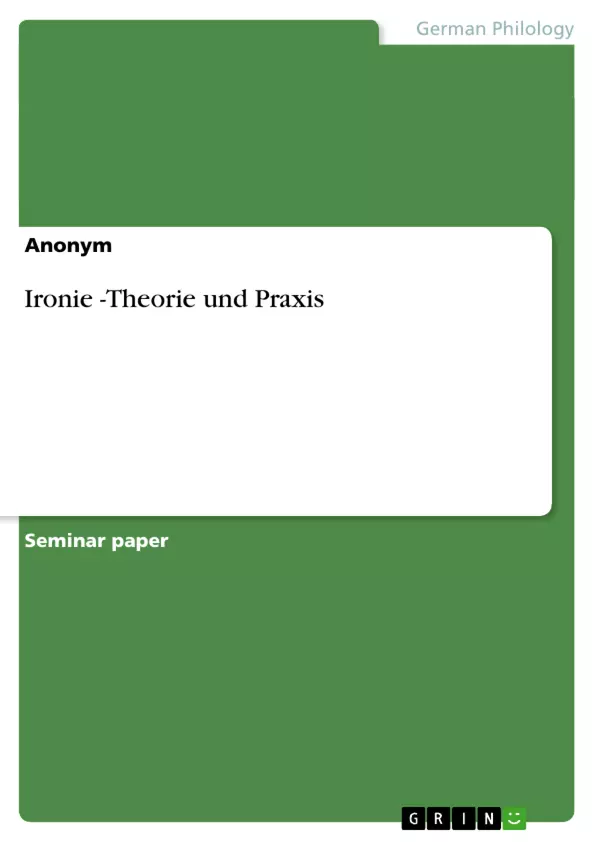In this paper, I want to explore the accounts of irony given by Wilson and Sperber, Blakemore, and Clark. Wilson and Sperber formulated a theory of irony that has been commented on by almost every theorist of irony that came after them. Their notion that irony is echoing interpretive use of language is taken up and modified by Blakemore, who adds further components derived from the concept of weak implicature. The breach between Clark’s and Blakemore’s account of irony is wider than that between the accounts of Sperber and Wilson and Blakemore. Clark introduces a new focus on irony, stressing the fact that every ironical utterance is a joint pretense that requires some sort of coordination of the speaker’s and the hearer’s actions. The descriptions of Sperber and Wilson, Blakemore, and Clark will each be followed by a discussion of their theses in which I will focus on the problems that seem unresolved by the respective theory. I begin with an account and a subsequent short discussion of theories of irony from Cicero to Grice to Sperber and Wilson. [...]
Inhaltsverzeichnis (Table of Contents)
- Introduction
- From the Semantic Theory to the Pragmatic Theory to the Mention Theory of Irony. From Cicero to Grice to Sperber and Wilson
- Blakemore
- Clark: The Pretense Theory of Irony
- Conclusion
Zielsetzung und Themenschwerpunkte (Objectives and Key Themes)
This paper examines various accounts of irony, focusing on the theories of Wilson and Sperber, Blakemore, and Clark. It explores how each theorist builds upon and modifies previous understandings of irony, highlighting the strengths and weaknesses of each approach. The analysis aims to identify the key elements of a comprehensive theory of irony that can account for its diverse manifestations.
- The development of irony theories from traditional rhetorical definitions to pragmatic and mention-based approaches
- The role of context and conversational implicature in interpreting ironic utterances
- The distinction between use and mention of utterances in understanding irony
- The concept of joint pretense and its relevance to irony
- The limitations of existing theories and the need for a more nuanced understanding of irony
Zusammenfassung der Kapitel (Chapter Summaries)
- Introduction: Introduces the paper's objective of exploring different accounts of irony by Wilson and Sperber, Blakemore, and Clark.
- From the Semantic Theory to the Pragmatic Theory to the Mention Theory of Irony. From Cicero to Grice to Sperber and Wilson: Traces the evolution of irony theories from traditional rhetorical definitions to Grice's pragmatic account and Sperber and Wilson's mention theory, highlighting the strengths and weaknesses of each approach.
- Blakemore: Summarizes Blakemore's contribution to irony theory, focusing on her modification of Sperber and Wilson's ideas and the role of weak implicature.
- Clark: The Pretense Theory of Irony: Presents Clark's view of irony as a joint pretense requiring coordination between speaker and hearer, contrasting it with the theories of Sperber and Wilson and Blakemore.
Schlüsselwörter (Keywords)
This paper focuses on irony, exploring key concepts like semantic theory, pragmatic theory, mention theory, conversational implicature, weak implicature, joint pretense, and the theories of irony proposed by Wilson and Sperber, Blakemore, and Clark.
Frequently Asked Questions
What is Wilson and Sperber's theory of irony?
Wilson and Sperber propose the "Mention Theory," suggesting that irony is an echoing interpretive use of language where the speaker mentions a thought or utterance to express a mocking attitude.
How does Herbert Clark's view of irony differ?
Clark introduces the "Pretense Theory," arguing that irony is a joint pretense where the speaker pretends to be an injudicious person speaking to an uncomprehending audience.
What role does context play in understanding irony?
Pragmatic theories emphasize that irony cannot be understood by semantics alone; it requires recognizing the speaker's intentions and the conversational implicature within a specific context.
What is "weak implicature" in Blakemore's account?
Blakemore modifies the mention theory by incorporating concepts of weak implicature to better explain how hearers derive ironic meaning from subtle linguistic cues.
How did Grice influence modern irony theories?
Grice viewed irony as a violation of the Cooperative Principle (specifically the maxim of quality), which forces the hearer to look for a non-literal meaning.
- Quote paper
- Anonym (Author), 2005, Ironie -Theorie und Praxis, Munich, GRIN Verlag, https://www.grin.com/document/71902



